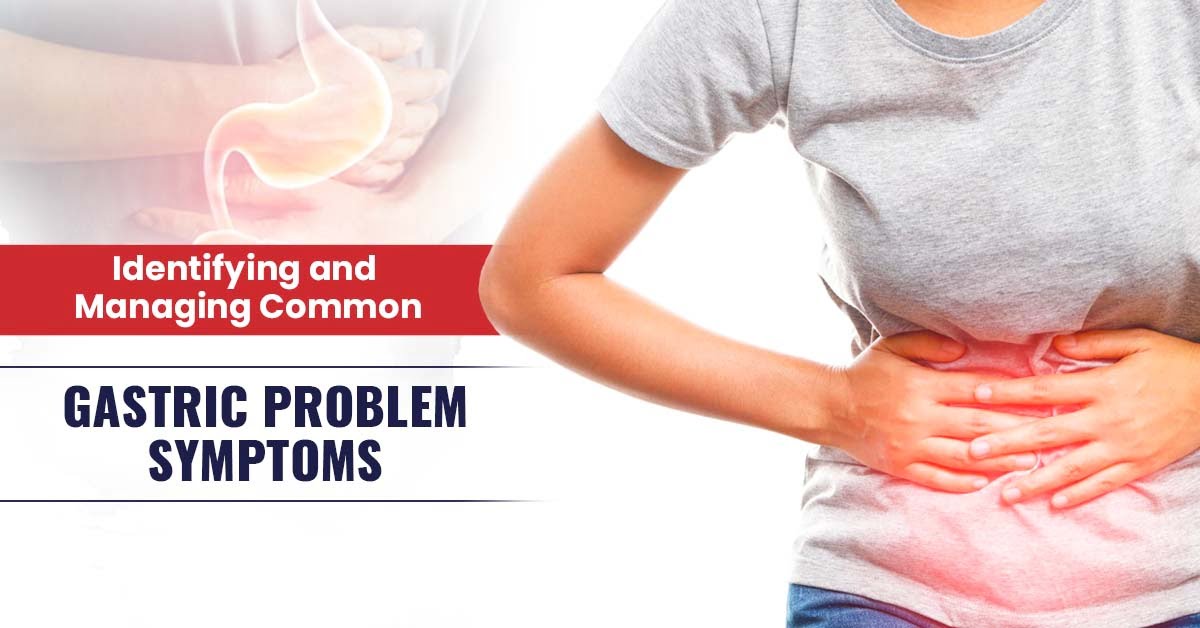


[vc_row][vc_column][vc_column_text]You know your body’s stress level, poor eating habits, and lifestyle decisions are typically the root causes of digestive issues. More often than we realise, these things might have an impact on our health. While the majority of stomach troubles can be easily resolved with a few dietary and lifestyle adjustments, some gastric problem symptoms may indicate more significant health concerns that require urgent care. We’ll talk about common symptoms of stomach issues here, so you’ll know how to spot them and hear about treatment options.
Heartburn: One of the most typical indications of digestive problems is heartburn. It’s described as a sensation of burning in the chest. This occurs when stomach acid backs up into the oesophagus, causing pain. Alcohol, caffeine, and spicy foods are a few factors that might exacerbate heartburn. Thus, to prevent heartburn, be sure to include some nutritious meals in your diet.
Ingestion: In the field of medicine, indigestion is frequently referred to as dyspepsia. Upper abdomen pain or discomfort, often accompanied by gas, bloating, and nausea, is the hallmark of indigestion. Overindulging, eating too rapidly, or consuming fatty meals are the main causes of indigestion.
Acid reflux: It is the term for the condition in which stomach acid escapes the oesophagus and returns, leaving the mouth tasting sour or bitter and feeling as though food is being ingested. Complications such as Barrett’s oesophagus and esophagitis can result from persistent acid reflux.
Bloating: Bloating is the term for the feeling of fullness or tightness in the belly, which is frequently accompanied by outward signs of swelling. It may be caused by consuming too much food or drinks, producing too much gas, or swallowing air when eating or drinking. It is a very common problem that can be dealt with proper care. It is one of the major sign of upper intestinal gas.
Abdominal discomfort: Constant abdominal discomfort, which can range from mild sensations to sharp cramps, may be a sign of several gastrointestinal issues, including gastritis, peptic ulcers, or gastroenteritis. The location and intensity of the pain may vary depending on the underlying cause.
Vomiting and Nausea: Usually caused by digestive disorders or irritation of the stomach lining, vomiting and nausea are common indications of stomach troubles. Blood in the vomit or severe vomiting should be handled medically immediately.
Dietary Adjustments: Gastric symptoms can be controlled by eating a diet high in fruits, vegetables, whole grains, and lean meats and avoiding hot, fatty, and acidic meals. It helps in improving overall health. Indigestion and acid reflux can also be avoided by taking smaller, more frequent meals and avoiding late-night eating. It is one major reason for gastric problems in our body.
Lifestyle Modifications: Yoga, meditation, or deep breathing are effective ways to reduce stress and alleviate gastrointestinal pains. Maintaining a healthy weight, eschewing form-fitting clothing, and assuming good posture are all beneficial in reducing abdominal tension and soothing your stomach.
Hydration: Drinking enough water throughout the day will help maintain a healthy digestive system and prevent constipation, which can exacerbate symptoms related to the stomach. However, try to limit your alcohol intake during meals since this may reduce stomach acid and lead to digestive issues.
Physical Therapy: By lowering stress levels, reducing bloating, and increasing digestion, a regular exercise regimen can improve stomach health. Try to get in at least 30 minutes of physical exercise most days of the week.
Seeking Medical Advice: See a healthcare provider for a correct diagnosis and treatment plan if symptoms worsen or return after making lifestyle improvements, or if you suffer from severe or persistent stomach discomfort. It may be necessary to treat underlying illnesses including gastritis, peptic ulcers, or gastroesophageal reflux disease (GERD) with medication, dietary changes, or other therapies.
You will know you have a gastric problem with its symptoms. The common symptoms of gastric issues include burping, bloating, nausea, and discomfort in the abdomen. Changes in bowel habits, heartburn, or persistent indigestion can potentially be signs of stomach problems. It is best to see a gastro doctor for an assessment and diagnosis if you often feel like this after eating or if you see a pattern of discomfort.
This pain is in the abdomen area and is frequently described as acute or cramping. Anywhere from the lower belly to the chest region might experience this discomfort. They can differ in length and severity, and they frequently come with bloating or a fullness sensation. Knowing the location and type of these pains might help rule out gastrointestinal problems and get the right medical care.
Whether it is upper intestinal gas or lower intestinal gas, the signs are somewhat common. Signs of gas include pain in the abdomen, flatulence, and bloating. People may also feel full even after consuming tiny amounts of food, or they may belch excessively. The symptoms of gas are frequently associated with dietary practices, such as eating specific foods that are known to produce gas. To rule out underlying illnesses, persistent discomfort that is accompanied by changes in bowel movements or other symptoms like nausea should be seen by a doctor.
It is essential to recognise and treat the symptoms of stomach problems to guard your digestive health and general well-being. People can successfully relieve stomach discomfort and enhance their quality of life by implementing healthy lifestyle practices, dietary adjustments, and prompt medical guidance when necessary. Always pay attention to your body, make self-care a priority, and seek the advice and help of a healthcare provider when needed.[/vc_column_text][/vc_column][/vc_row]
September 30, 2024
Recognize the Signs: Understanding Appendicitis Pain Symptoms
September 24, 2024
Unveiling the Truth: I-Pill Side Effects Every Woman Should Know
We use cookies to enhance your experience. By clicking "Accept", you agree to our use of cookies.